Shebbear College
Shebbear College is a co-educational independent school situated in Shebbear, Devon, England.
| Shebbear College | |
|---|---|
| Location | |
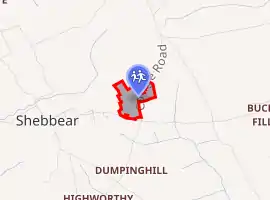
| |
| , , EX21 5HJ England | |
| Coordinates | 50.864°N 4.204°W |
| Information | |
| Type | Independent day and boarding school |
| Motto | Ad Gloriam Per Spinas ("To Glory Through Thorns") |
| Religious affiliation(s) | Methodist |
| Established | 1829 - Founded as 'Prospect College' 1841 - Re-founded as 'Shebbear College' |
| Founder | Bible Christian Church |
| Department for Education URN | 113605 Tables |
| Head | Caroline Kirby |
| Gender | Coeducational |
| Age | 2 to 18 |
| Enrolment | 300 as of January 2020[1] |
| Houses | Way Thorne Ruddle Pollard |
| Colour(s) | Red, Gold & Black |
| Former pupils | Old Shebbearians |
| School song | Integer Vitae Scelerisque Purus |
| Website | https://www.shebbearcollege.co.uk |
Founded by the Bible Christian Society in 1829, Shebbear is one of the world's oldest Methodist schools, and belongs to a group of independent boarding schools that form part of the Methodist Church's involvement in education.
History
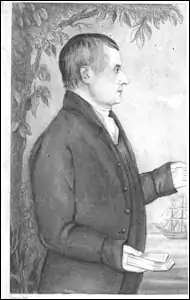
Bible Christian Church
The Bible Christian Church was one of the denominations that merged in the United Methodist Church, its early preachers appealed solely to the Bible in confirmation of their doctrines. The denomination arose in the agricultural districts and fishing villages of north Cornwall and Devon; a district only slightly influenced by John Wesley and the original Methodist movement. The founder of the movement was William O'Bryan, a Methodist lay preacher of Luxulyan, Cornwall. O’Bryan commenced his labours in north Devon, and in 1815 a small society was formed at Lake Farm, Shebbear.
On O'Bryan’s departure, the first fully recognised minister James Thorne, at whose father’s farm the connexion had started, became its leader. Thorne laid the foundations broadly in evangelism, finance, temperance and education.
Prospect College
Shebbear College began its life in 1829. James Thorne’s two sons, John and Samuel, began a Christian school for 20 boys called Prospect College after the name of the house built to accommodate the school. It was originally formed for the sons of Bible Christians to train for the ministry. The emblem ‘PC’ still remains engraved on the main gates to this day.
Shebbear College
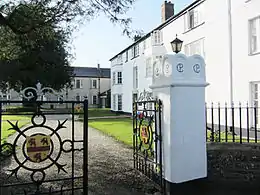
The school saw many changes until it was re-founded by the Bible Christian Church in 1841 as Shebbear College. The first headmaster was an Irish clergyman, Rev. H. C. O'Donoghue, formerly Chaplain to William IV, who had seceded from the Established Church on conscientious grounds.[2]
The Earl of Portsmouth opened a block of new buildings at Shebbear College in 1878, and offered a £5 prize for the best essay on “The Effect of the Revolution of 1688 on Constitutional Progress and National Life.”[3]
In October 1882, Sir Thomas Dyke Acland urged upon the College authorities the immediate building of a science laboratory. He himself subscribed liberally to the funds necessary for such a purpose and his example was followed by W. J. Harris, Esq. (M.P. for Poole), a great friend of the College. This formed part of a new scheme of extension, including a new wing to the main complex, which was opened by Sir Thomas Acland in 1884.[4]
Edgehill College, founded for Methodist girls in nearby Bideford in 1884, was considered the college's 'sister-college'.
In 1891 Sir Samuel Way visited England and purchased the freehold of Lake Farm in Shebbear, and then conveyed it to Shebbear College as an endowment.[3]
Numerous missionaries from Shebbear College were sent to China in the Bible Christian Mission. This mission included Samuel Pollard, creator of Pollard script (Chinese: 柏格理苗文 Bó Gélǐ Miao-wen). The main building of the Hopkins–Nanjing Center is named in Pollard's honour.[3]
The present school still includes many original buildings and features, as well as buildings erected for the boarders. Shebbear College now offers education for boys and girls aged 3–18, having become co-educational in 1993.
The college is small in size and has attendance of 340 pupils as of March 2017, from ages 3 to 18.[1]
Houses
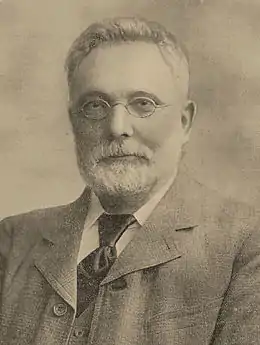
Day Houses
The college is divided into four day houses that compete both academically and in sport; namely:
- Ruddle - named after the College's most influential headmaster, Thomas Ruddle.
- Thorne - named after one of the founders of the College, Samuel Thorne.
- Way - named after Sir Samuel Way.
- Pollard - after Samuel Pollard.
Boarding Houses
Two of these houses are also boarding houses:
- Ruddle - girls' boarding house
- Pollard - boys' boarding house
Facilities
The College stands in 85 acres of grounds with a mix of formal gardens, lawns, open fields and woodland. Its facilities include:
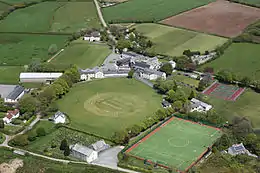
- Sports Centre: includes gym and dance studio
- All weather pitch
- Preparatory School
- Pre-prep school
- Sixth Form Centre - officially opened by Sir Gary Sobers on 1 July 2016
- Music Centre - officially opened by Peter Gordeno (musician) on 27 April 2018
- 5 car parks
- 3 boarding houses
- Two biomass plants
- Solar panel field
- New dining facilities
- Modern Languages department - opened by Michael Morpurgo on 1 July 2011
- Library
- Life Skills Centre
- Science block
- Two assembly halls
Old Shebbearians
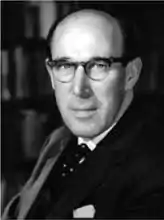
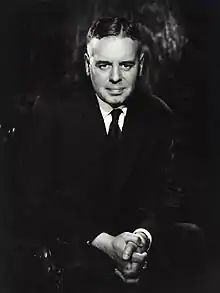 Charles Kingsley Barrett FBA
Charles Kingsley Barrett FBA_(10874853953).jpg.webp)
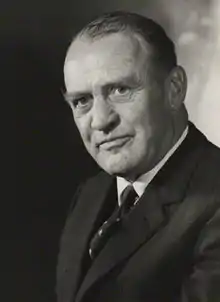
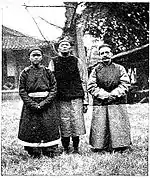
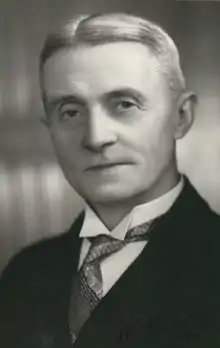
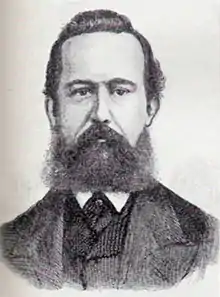

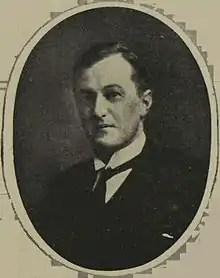
Alumni of Shebbear College are known as Old Shebbearians. Notable alumni include:
- Charles Kingsley Barrett FBA (1917 - 2011) - British biblical scholar[5]
- Sir (Reginald) Pridham Baulkwill (b.1895-d.1974) - Solicitor
- John Cater - Actor [6]
- James Lewis Duncan (1892 - 1960) - Canadian politician and lawyer [7]
- Steve Drowne - Jockey; Winner, 2000 Coventry Stakes at Royal Ascot
- Sir Alfred Earle GBE (1907 - 1990) - RAF Vice Chief of Defence to Lord Mountbatten of Burma; Director General of British Defence Intelligence 1966-1968[8]
- Jim Hancock - BBC Political Correspondent; Presenter, "The Politics Show"
- Thomas Saunders Hobbs (1856 - 1927) - English-born Ontario merchant and political figure
- Samuel Pollard (1864 - 1915) - British Methodist missionary to China and creator of Pollard script [9]
- John Damrel Prior (1840 – 1923) - British trade unionist.
- Sir Frederick William Richards (1869-1957) - Australian jurist
- Sir Ivan Stedeford GBE (1897 - 1975) - Chairman & CEO Tube Investments Leading British Industrialist
- Sir Samuel Way, 1st Baronet QC (1836-1916) - Chief Justice and Lieutenant-Governor of South Australia and Chancellor of the University of Adelaide[10]
- Wilf Weeks (b.1949) - Head of the Private Office of Prime Minister Sir Edward Heath (1976-1980); Chairman, Heritage Education Trust
- Hugh F. Durrant-Whyte - pioneer in probabilistic methods for robotics.
- William Woolcock (1878 - 1947) - Member of Parliament for Hackney Central[11][12]
Headteachers
- Samuel Thorne (1831–1841)
- The Reverend Hallifield Cosgayne O'Donnoghue (1841–1842)
- The Reverend William Kelly (1847-1855)
- Thomas Ruddle (1864–1909)
- J.Rounsefell (1909–1932)
- Leslie Johnson (1933–1942)
- Jack B. Morris (1942–1964)
- George Washington Kingsnorth (1964–1983)
- Russell Buley (1983–1997)
- Leslie Clarke (1997–2003)
- Robert Barnes (2003–2013)
- Simon Weale (2013–2019)
- Caroline Kirby (2019–Present)
References
- "Establishment: Shebbear College". ISI. Department for Education. Retrieved 28 September 2017.
- "The British monthly; an illustrated record of religious life and work". London Hodder and Stoughton – via Internet Archive.
- Wickes, Michael (2007). "THE WEST COUNTRY PREACHERS" (PDF). genuki.cs.ncl.ac.uk. Retrieved 11 September 2020.
- Dymond, G. P. (11 September 1913). "Thomas Ruddle of Shebbear : a North Devon Arnold ; his life and selections from his letters". London : Henry Hooks – via Internet Archive.
- "Echo". [Thousand Oaks, Calif.] – via Internet Archive.
- Coveney, Michael (13 May 2009). "Obituary: John Cater". the Guardian.
- "Torontonensis, 1910". Toronto : Students' Administrative Council of the University of Toronto [etc.] 11 September 1910 – via Internet Archive.
- "A Earle_P". www.rafweb.org. Retrieved 11 September 2020.
- "My United Methodists".
- "Kent Law School home page". Kent Law School - University of Kent. Retrieved 11 September 2020.
- "The chemist and druggist [electronic resource]". London : Morgan Brothers. 11 September 1907 – via Internet Archive.
External links
- Official website
- The "Old Shebbearians Association" official website